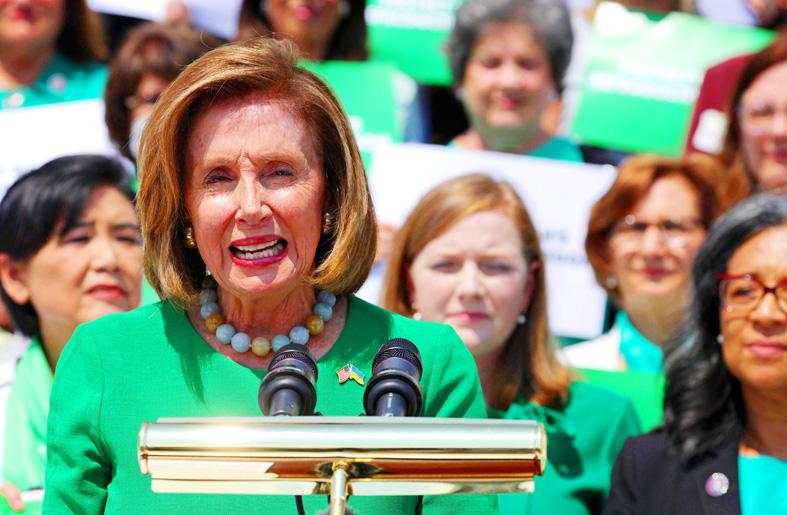Many Taiwanese have shrugged off China’s warnings of repercussions from a possible trip to Taipei by US House of Representatives Speaker Nancy Pelosi, saying they are accustomed to Beijing’s saber rattling and saw no cause for alarm.
Such a trip would be the first by a US House speaker since 1997.
While news of a possible visit has been widely reported in Taiwan, front-page stories in the past week have focused on political campaigns ahead of local elections this year, as well as record-breaking temperatures.

Photo: AFP
Waiting for a doctor’s appointment on a busy street in Taipei, Chen Yen-chen gave voice to a widely held view about China’s remarks.
“That is mostly verbal threats and intimidation, so this time around I am quite at ease,” said the 30-year-old, who works in education.
Visits by US officials to Taiwan have become a frequent source of tension between Beijing and Washington.
Despite fears that a visit could trigger a fourth crisis over the Taiwan Strait since 1949, politicians and diplomats in Taiwan have said that people are used to military intimidation by the Chinese People’s Liberation Army (PLA).
“To the Taiwanese people, Chinese threats have never stopped in the past decades. It’s happening every day,” Democratic Progressive Party Legislator Wang Ting-yu (王定宇) said. “Taiwan needs to be on guard, but Taiwan will not cave in to fear.”
A visit by Pelosi would be welcomed, said Chinese Nationalist Party (KMT) Department of International Affairs director Alexander Huang (黃介正), who is also the party’s representative in the US.
“Of course it raises Taiwan’s visibility and it shows the American commitment to Taiwan in a pretty formal way,” Huang said, describing the impact such a visit would have.
Beijing’s threats of unspecified “serious consequences” are merely the same old warnings for 26-year-old office assistant Hung Chien, who said: “I am already used to China issuing such statements, so I am not overly nervous.”
Military threats have only made Taiwan more determined to stand up to Beijing, some analysts said.
For example, during the Third Taiwan Strait crisis in 1995 and 1996, the PLA fired missiles into the waters near Taiwan ahead of its first direct presidential vote.
That move was widely interpreted as a warning against supporting a candidate Beijing saw as pushing for Taiwan’s formal independence.
Former president Lee Teng-hui (李登輝) won by a landslide.

Taiwan is stepping up plans to create self-sufficient supply chains for combat drones and increase foreign orders from the US to counter China’s numerical superiority, a defense official said on Saturday. Commenting on condition of anonymity, the official said the nation’s armed forces are in agreement with US Admiral Samuel Paparo’s assessment that Taiwan’s military must be prepared to turn the nation’s waters into a “hellscape” for the Chinese People’s Liberation Army (PLA). Paparo, the commander of the US Indo-Pacific Command, reiterated the concept during a Congressional hearing in Washington on Wednesday. He first coined the term in a security conference last

Prosecutors today declined to say who was questioned regarding alleged forgery on petitions to recall Democratic Progressive Party (DPP) legislators, after Chinese-language media earlier reported that members of the Chinese Nationalist Party (KMT) Youth League were brought in for questioning. The Ministry of Justice Investigation Bureau confirmed that two people had been questioned, but did not disclose any further information about the ongoing investigation. KMT Youth League members Lee Hsiao-liang (李孝亮) and Liu Szu-yin (劉思吟) — who are leading the effort to recall DPP caucus chief executive Rosalia Wu (吳思瑤) and Legislator Wu Pei-yi (吳沛憶) — both posted on Facebook saying: “I

The Ministry of Economic Affairs has fined Taobao NT$1.2 million (US$36,912) for advertisements that exceed its approved business scope, requiring the Chinese e-commerce platform to make corrections in the first half of this year or its license may be revoked. Lawmakers have called for stricter enforcement of Chinese e-commerce platforms and measures to prevent China from laundering its goods through Taiwan in response to US President Donald Trump’s heavy tariffs on China. The Legislative Yuan’s Finance Committee met today to discuss policies to prevent China from dumping goods in Taiwan, inviting government agencies to report. Democratic Progressive Party Legislator Kuo Kuo-wen (郭國文) said

The Ministry of Economic Affairs has fined Taobao NT$1.2 million (US$36,900) for advertisements that exceeded its approved business scope and ordered the Chinese e-commerce platform to make corrections in the first half of this year or its license would be revoked. Lawmakers have called for stricter supervision of Chinese e-commerce platforms and more stringent measures to prevent China from laundering its goods through Taiwan as US President Donald Trump’s administration cracks down on origin laundering. The legislature’s Finance Committee yesterday met to discuss policies to prevent China from dumping goods in Taiwan, inviting government agencies to report on the matter. Democratic Progressive Party